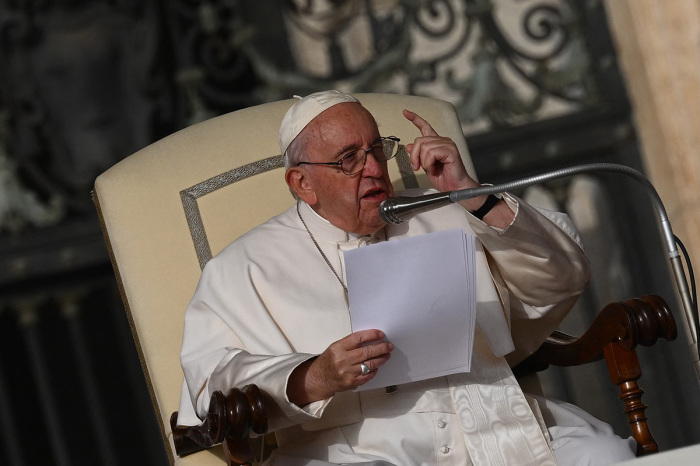Catholic clergy, scholars demand Pope Francis withdraw declaration authorizing gay couple blessings

More than 90 Catholic clergymen, scholars and lay people are calling on Pope Francis to withdraw a controversial Vatican document authorizing priests to offer blessings to same-sex couples.
In a letter published Friday, Catholic pastors, clergy, scholars, professors and doctors urged all Cardinals and Bishops of the Roman Catholic Church to forbid the application of “Fiducia Supplicans” in their dioceses and asked Francis to withdraw the document. Issued by the Vatican’s Dicastery of the Doctrine of the Faith on Dec. 18, “Fiducia Supplicans” allows priests to bless-same sex couples while stressing that “one should neither provide for nor promote a ritual for the blessings of couples in an irregular situation.”
While the Vatican has defended the document, many conservative Catholics insist it runs afoul of Catholic Church teaching on marriage and sexuality. In Friday’s letter, the signatories wrote that “despite its explicit reaffirmation of the traditional doctrine of the Church on Marriage, it turns out that the pastoral practice that the document allows is in direct opposition to it.”
Expressing concern that “the document has been very favorably received by those few episcopates and prelates that for decades have been openly advocating a change in the doctrine on sexual morality,” the signatories concluded “it is evident that the practical message that this new declaration transmits is much more in line with the program and ideas of those who want to change the doctrine, than with the doctrine itself that the document claims to keep intact.”
“The document effectively attempts to introduce a separation between doctrine and liturgy on the one hand, and pastoral practice on the other. But this is impossible: in fact, pastoral care, like all action, always presupposes a theory and, therefore, if pastoral care performs something that does not correspond to the doctrine, what is actually being proposed is a different doctrine,” the letter added.
According to the letter, “The fact is that a priest is imparting a blessing on two people who present themselves as a couple, in the sexual sense, and precisely a couple defined by its objectively sinful relationship. Therefore — regardless of the intentions and interpretations of the document, or the explanations the priest may try to give — this action will be the visible and tangible sign of a different doctrine, which contradicts traditional doctrine.”
Warning that “the faithful will not even be aware of the subtle theoretical justifications introduced by the Declaration,” the signatories predicted that “the message that is effectively launched, and that the people of God, and the entire world, will inevitably register and are already registering is that: The Catholic Church has finally evolved, and now accepts homosexual unions, and, more generally, extramatiral unions.”
“It is definitely not justifiable, especially for a cardinal or bishop, to remain silent, since the scandal that has already occurred is serious and public, and if it is not stopped, it is bound to be more and more amplified,” the letter declared. “The threat does not become smaller but more serious, since the error comes from the Roman See, and is destined to scandalize all the faithful, and above all the little ones, the simple faithful who have no way of orienting and defending themselves in this confusion.”
The signatories pointed to two passages from Scripture when making the case that bishops and cardinals had the opportunity to speak out forcefully against “Fiducia Supplicans.” They included a quote from the Sermon on the Mount declaring that “whoever offends one of these little ones who believe in me, it would be better for him if a donkey’s millstone were hung around his neck and he were drowned in the depths of the sea.”
The other Bible passage cited in the letter, taken from the book of the Prophet Ezekiel, proclaims that “If the watchman sees the sword coming and does not blow the horn, so that the people are not warned, and when the sword comes he kills of one of them, he will perish because of him, but I will ask the watchman to account for his blood.”
Toward the end of the letter, the signatories implored the bishops to “follow the brave example of so many brother bishops around the world” by forbidding blessings of same-sex couples in their dioceses and asked the pope to withdraw “Fiducia Supplicans,” which they characterized as “in contradiction with both Scripture and the universal and uninterrupted Tradition of the Church.”
“In this difficult moment, a clear word of truth would be the best example of your faithful and courageous dedication to the people of God entrusted to you, a sign of fidelity to the true mission of the Papacy and at the same time the best help for the pope himself, an eloquent ‘fraternal correction,’ which he urgently needs in this last and most critical period of his pontificate and probably of his life,” they concluded.
The signatories told the cardinals and bishops that “if you act promptly, there is still some hope that he may rescue his pontificate and his own person from a stain that could otherwise weigh on him indelibly, not only in history, but in eternity.”
A total of 92 individuals signed onto the letter ahead of its initial publication. Notable signatories include former head of the American College of Pediatricians Dr. Michelle Cretella and Regis Martin, a professor at the Franciscan University of Steubenville who previously called on Francis to resign over “Fiducia Supplicans.”
Those hoping to sign onto the letter still have time to do so. The end of the letter invites “qualified individuals” to provide their “name, qualifications, position, and location by Feb. 15” in an email to filialappeal@gmail.com. An updated list of signatories will be released on Feb. 17.
Ryan Foley is a reporter for The Christian Post. He can be reached at: ryan.foley@christianpost.com





























